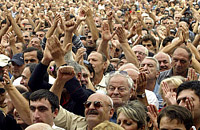Anti-government protesters broken up by security forces in Georgia

Democracy is just nothing when it’s a political crisis. Security forces clashed with anti-government protesters in Tbilisi on Wednesday, driving them from the street in front of parliament and breaking up another rally.
Helmeted riot police with shields moved in toward the crowd outside parliament, where opponents of President Mikhail Saakashvili have protested since Friday. As the several hundred officers advanced, the demonstrators retreated down Tbilisi's main avenue.
Police fired tear gas from the beds of pickup trucks. Many wore gas masks, and live televised footage showed several people choking, including police. Scattered fist fights broke out between uniformed police and protesters.
Later, riot police again used tear gas, water cannons and rubber bullets to break up another demonstration in another part of Tbilisi, with some truncheon-wielding police beating protesters who clamored over the city's ancient walls, threw stones and taunted police.
An estimated 250 people were injured in the running clashes throughout the day, Health Minister David Tseshelashvili said.
Six days of protests in Tbilisi have stoked the worst crisis that U.S.-ally Saakashvili has faced since being propelled to power in the 2003 Rose Revolution mass protests.
The protests of the past six days have drawn thousands of people to the parliament building to demand Saakashvili's resignation and call for changes in election schedules and legislation.
Marina Kuparadze, 35, said she had supported Saakashvili - called by his diminutive name Misha by many protesters - in the wake of the Rose Revolution.
"I voted for Misha back then, but after what he did today he has in fact become a political corpse," she said, referring to the crackdown on protesters.
In the early morning, police forced dozens of demonstrators from the site where they had remained overnight, and detained two opposition leaders, but demonstrators streamed back a few hours later and the crowd grew to more than 1,000 people. Police wielded truncheons as they sought to keep protesters off the main street, and beat several people.
Opposition forces had gathered at the site every day since Friday, when more than 50,000 people rallied. The protesters initially called for changes in the dates of planned elections and in the electoral system, but later made Saakashvili's resignation their central demand.
Despite the tension and high political drama broadcast live on Georgian and Russian TV, it was unclear how much support the opposition had from the rest of the country.
"What was strange about breaking up the protests? Everything was done in the framework of the constitution. They were on the square for five days. They blocked transport," said Tariel Chagunava, a 52-year-old Tbilisi lawyer. "What happened today is what would happen in any democratic country."
Many of the pro-Western president's opponents support his aims, such as closer ties with the United States and Europe. He has also sought to decrease Russia's influence on the small, economically struggling Caucasus Mountain nation and to establish central government control over two separatist regions that have run their own affairs with Russian support since wars in the early 1990s.
The economy has improved, once-chronic power outages are far rarer and corruption is less pervasive than in the past.
But opponents accuse Saakashvili of sidestepping the rule of law and sliding toward authoritarianism, creating a system marked by violations of property rights, a muzzled media and political arrests.
Saakashvili has rejected his opponents' demands, saying parliamentary elections would be held as planned and that - far from stepping down - he would run for a second term in a presidential vote expected in late 2008. He suggested Monday that Russia was fomenting the unrest.
Russian Foreign Minister Sergey Lavrov on Tuesday dismissed the Georgian leadership's action as "farce."
Subscribe to Pravda.Ru Telegram channel, Facebook, RSS!


